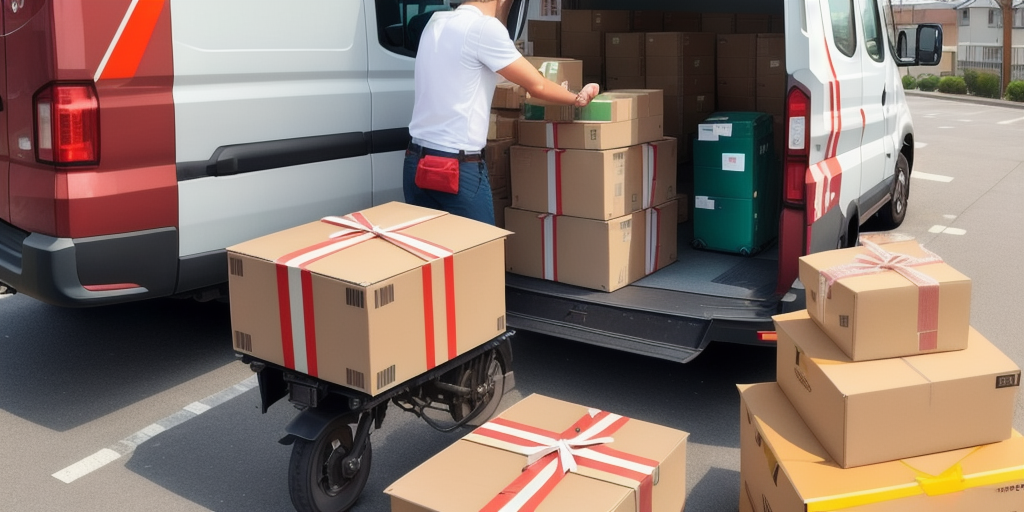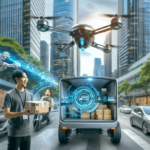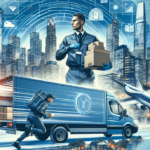Experience the Convenience of Instant Delivery Service
In today's fast-paced world, instant delivery services are revolutionizing the way businesses and individuals handle shipments. Offering same-day or even same-hour delivery options, these services provide unparalleled convenience and efficiency. This article delves into the numerous benefits of instant delivery services, compares them with traditional shipping methods, and offers guidance on selecting the best service to meet your needs. Additionally, we explore the latest trends and the impact of instant delivery on the environment.
Benefits of Instant Delivery Services for Businesses
As e-commerce continues to surge, businesses must adapt to meet the growing demand for swift and dependable deliveries. Instant delivery services empower businesses to stay competitive by offering rapid delivery options that enhance customer satisfaction and loyalty.
Enhancing Competitiveness and Market Reach
Instant delivery services enable businesses to cater to customers who prioritize speed, providing a significant edge in competitive markets. According to a McKinsey report, customers are more likely to return to businesses that offer fast and reliable delivery options, leading to increased sales and revenue.
Reducing Carbon Footprint
By consolidating shipments and optimizing delivery routes, instant delivery services can significantly reduce the number of vehicles on the road. This not only minimizes carbon emissions but also lowers transportation costs for businesses. A study by the World Bank highlights the environmental benefits of efficient logistics practices.
Improving Customer Satisfaction and Loyalty
Fast and reliable deliveries enhance the overall customer experience, fostering loyalty and encouraging repeat business. Real-time tracking and prompt delivery notifications further boost customer confidence and satisfaction.
Advantages of Instant Delivery for Online Shoppers
For consumers, instant delivery services transform the online shopping experience by eliminating long wait times and providing immediate access to essential items.
Unparalleled Convenience
Instant delivery allows customers to receive their orders within hours, making online shopping more appealing, especially for urgent needs such as medications or important documents. According to Statista, the demand for rapid delivery options has steadily increased, reflecting consumers' desire for convenience.
Environmental Sustainability
By utilizing local couriers and optimizing delivery routes, instant delivery services can lower the carbon footprint associated with transportation. This sustainable approach aligns with the growing consumer preference for environmentally responsible businesses.
Comparing Instant Delivery with Traditional Shipping Methods
When selecting a delivery service, it's essential to weigh the pros and cons of instant delivery versus traditional shipping methods.
Delivery Speed and Reliability
Traditional shipping methods, such as postal services, typically offer more cost-effective solutions but lack the speed and real-time tracking features of instant delivery services. Instant delivery, while more expensive, provides unmatched speed and reliability, making it ideal for time-sensitive shipments.
Cost Considerations
Instant delivery services generally come at a higher cost compared to traditional methods. However, the added expense can be justified by the increased customer satisfaction and potential for higher sales. Businesses must evaluate their budget and delivery needs to determine the most appropriate option.
Geographical Reach
Traditional shipping services often have a broader reach, including remote and hard-to-access areas. Instant delivery services may be limited to urban centers or charge premium rates for distant locations. It's crucial to consider the recipient's location when choosing a delivery method.
Choosing the Right Instant Delivery Service
Selecting the best instant delivery provider requires careful consideration of several factors to ensure that the service aligns with your specific needs.
Coverage and Availability
Ensure that the delivery service operates in your area and covers the regions where your customers are located. A comprehensive coverage area guarantees that you can serve a wider customer base effectively.
Pricing and Delivery Options
Compare pricing structures and delivery options offered by different providers. Some may offer flat rates, while others charge based on distance or package weight. Additionally, look for services that provide flexible delivery windows to accommodate various customer preferences.
Real-Time Tracking and Notifications
Opt for services that offer real-time tracking and delivery notifications. These features enhance transparency and allow both businesses and customers to monitor the shipment's progress, reducing uncertainty and improving satisfaction.
Customer Service and Support
Reliable customer support is essential for resolving any issues that may arise during the delivery process. Choose providers that offer multiple communication channels, such as phone, email, and live chat, and have responsive support teams.
Reputation and Reviews
Research customer reviews and testimonials to gauge the reliability and quality of the delivery service. Positive feedback from other businesses and consumers can provide confidence in your decision.
Future Trends in Instant Delivery Services
The instant delivery landscape is continually evolving, driven by technological advancements and changing consumer expectations. Several key trends are shaping the future of this industry.
Drone and Autonomous Vehicle Deliveries
Innovations in drone technology and autonomous vehicles are set to revolutionize instant delivery services. Companies like Amazon and Google are investing in drone delivery systems, which promise to reduce delivery times and operational costs. However, regulatory and safety challenges must be addressed before widespread adoption can occur.
Integration with Smart Technology
The integration of smart technologies, such as artificial intelligence and machine learning, is optimizing delivery routes and improving efficiency. These advancements enable instant delivery services to predict demand patterns, manage inventory more effectively, and enhance overall service quality.
Sustainable Delivery Practices
Environmental sustainability remains a priority, with many instant delivery services adopting eco-friendly practices. The use of electric vehicles, bicycles, and other sustainable transportation methods helps reduce the carbon footprint and aligns with consumer preferences for green solutions.
Expansion into Healthcare
The healthcare sector is increasingly relying on instant delivery services for the rapid distribution of medical supplies and equipment. This trend is essential for supporting telemedicine and ensuring that patients receive necessary treatments promptly.
Impact of Instant Delivery on the Environment
While instant delivery services offer numerous benefits, they also have significant implications for the environment. However, with strategic practices, these services can contribute to sustainability.
Reducing Emissions Through Efficient Logistics
By optimizing delivery routes and consolidating shipments, instant delivery services can decrease the total distance traveled, leading to lower greenhouse gas emissions. Additionally, the adoption of electric and hybrid vehicles further mitigates environmental impact.
Minimizing Packaging Waste
Instant delivery often involves direct shipments from the point of origin to the recipient, reducing the need for multiple layers of packaging. This streamlined process not only cuts down on waste but also lowers costs for businesses and consumers.
Promoting Sustainable Practices
Many instant delivery providers are committed to sustainability, implementing practices such as using recyclable materials and investing in green technologies. These initiatives help minimize the environmental footprint of delivery operations.
Economics of Instant Delivery: Cost and Pricing Models
Understanding the cost structure of instant delivery services is crucial for businesses aiming to make informed decisions.
Pricing Structures
Instant delivery providers employ various pricing models, including flat fees, distance-based charges, and weight-dependent rates. Some may also offer subscription services or discounts for high-volume users, providing flexibility to accommodate different business needs.
Cost-Benefit Analysis
While instant delivery services typically incur higher costs than traditional shipping methods, the benefits such as increased customer satisfaction, higher sales, and improved brand loyalty can justify the investment. Businesses should conduct a cost-benefit analysis to determine the financial viability of integrating instant delivery into their operations.
Negotiating with Providers
For businesses with significant delivery volumes, negotiating customized pricing agreements with service providers can lead to substantial cost savings. Establishing strong partnerships ensures that businesses receive favorable rates and reliable service.
Overcoming Challenges in Implementing Instant Delivery Services
Despite the numerous advantages, implementing and scaling instant delivery services presents several challenges that businesses must address.
Logistical Complexity
Coordinating multiple pickups and drop-offs in real-time requires robust logistical systems and efficient management. Advanced software solutions and skilled personnel are essential for handling the intricacies of instant delivery operations.
High Operational Costs
The rapid pace of instant delivery demands significant investments in technology, infrastructure, and workforce. Businesses must allocate resources effectively to manage these costs while maintaining service quality.
Regulatory and Safety Concerns
Innovations like drone deliveries face regulatory hurdles and safety concerns that must be navigated carefully. Adhering to local laws and ensuring the safety of delivery operations are paramount for successful implementation.
Scalability
Scaling instant delivery services to meet growing demand without compromising quality requires strategic planning and continuous improvement. Businesses must ensure that their delivery systems are adaptable and can handle increased volumes efficiently.
Conclusion
Instant delivery services provide a transformative advantage for both businesses and consumers, offering unprecedented speed and convenience. By enhancing competitiveness, improving customer satisfaction, and contributing to environmental sustainability, these services are reshaping the logistics landscape. As technology advances and new trends emerge, the role of instant delivery is set to expand further, presenting both opportunities and challenges. Businesses that successfully navigate these dynamics will be well-positioned to thrive in the evolving market.




















